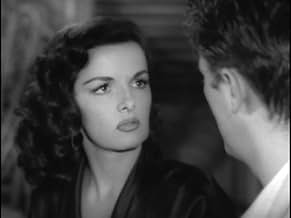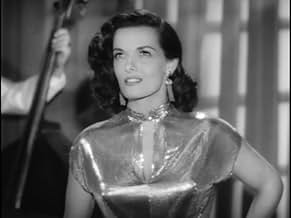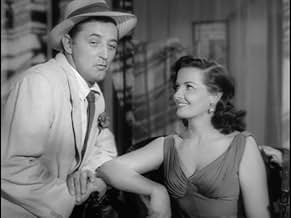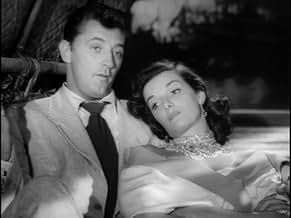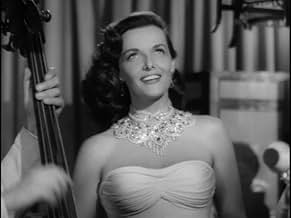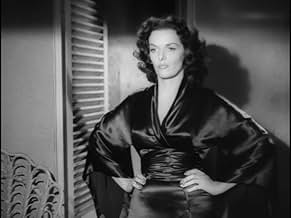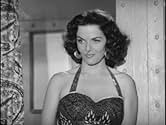IMDb RATING
6.6/10
4.1K
YOUR RATING
Nick Cochran, an American in exile in Macao, has a chance to restore his name by helping capture an international crime lord. Undercover, can he mislead the bad guys and still woo the attrac... Read allNick Cochran, an American in exile in Macao, has a chance to restore his name by helping capture an international crime lord. Undercover, can he mislead the bad guys and still woo the attractive singer/petty crook, Julie Benson?Nick Cochran, an American in exile in Macao, has a chance to restore his name by helping capture an international crime lord. Undercover, can he mislead the bad guys and still woo the attractive singer/petty crook, Julie Benson?
Abdullah Abbas
- Arabian
- (uncredited)
Rico Alaniz
- Bus Driver
- (uncredited)
Trevor Bardette
- Alvaris
- (uncredited)
Genevieve Bell
- Woman Passenger
- (uncredited)
George Blagoi
- Casino Patron
- (uncredited)
Truman Bradley
- Narrator
- (voice)
- (uncredited)
George Chan
- Chinese Photographer
- (uncredited)
Spencer Chan
- Hood
- (uncredited)
Suey Chan
- Casino Patron
- (uncredited)
Featured reviews
Hooray, Hollywood had the good sense to pair up Robert Mitchum and Jane Russell in another movie! After the sizzling magic between them in His Kind of Woman, they made Macao, which is incredibly similar and also very entertaining.
Added into this one-which is not a sequel, by the way, even though it's similar-are two sidekicks: William Bendix always adds character to a cast, and Gloria Grahame tries to take Bob away from Jane. Sorry, Gloria, but when Jane and Bob are together, there's just no stopping them. They banter, but there's something sweet underneath it all, showing that although both stars are big and tough, they'll always find time for romance. And, since they were lifelong friends, it helps knowing they had fun filming together!
Instead of Mexico, the leads are transported to China, but there's still intrigue, mystery, action, and fun quips mixed in amongst the romance. It's hard to decide whether His Kind of Woman or Macao is better; give them a whirl and try to decide for yourself!
Added into this one-which is not a sequel, by the way, even though it's similar-are two sidekicks: William Bendix always adds character to a cast, and Gloria Grahame tries to take Bob away from Jane. Sorry, Gloria, but when Jane and Bob are together, there's just no stopping them. They banter, but there's something sweet underneath it all, showing that although both stars are big and tough, they'll always find time for romance. And, since they were lifelong friends, it helps knowing they had fun filming together!
Instead of Mexico, the leads are transported to China, but there's still intrigue, mystery, action, and fun quips mixed in amongst the romance. It's hard to decide whether His Kind of Woman or Macao is better; give them a whirl and try to decide for yourself!
These RKO noirs sometimes don't make a lot of sense; "Macao" gets a little murky plot-wise, but otherwise, it's an entertaining film with an excellent cast. And as an added bonus, it has Josef von Sternberg at the helm until he was kicked off the movie, and then it has Nicholas Ray. Not bad.
Robert Mitchum, sexy and wide-shouldered in one of those loose-fitting tropical suits, plays Nick Cochran, going to Macao to start over after leaving the U.S. and spending time in the service. He originally thought he committed murder, but even though he hadn't, he kept going. On the boat en route to Macao, he meets beautiful, sexy, non-nonsense Julie Benson (Jane Russell) and a salesman (William Bendix).
When they arrive, Mitchum is taken for a police detective out to get a criminal/casino owner Halloran (Brad Dexter) back to the states. The chief of police (Thomas Gomez) is in cahoots with Halloran. Plus, Halloran becomes interested in Julie, so he really wants to get rid of Cochran. Criminals in Macao avoid the "three mile limit" - because three miles outside of Macao, international jurisdiction rules.
Apparently Mitchum did some rewrites on this script because it didn't make much sense. The cast and crew, all of whom had worked together many times, were a little too friendly for von Sternberg, which caused Mitchum to push all of his buttons. I'm not sure if Ray dragged Gloria Grahame with him or what, but she's wasted here, and she had no interest in this role. Can't blame her.
Despite all of this, Mitchum and Russell are great together, a wonderful, sexy combination. Both stars just ooze sex appeal, and Mitchum's laid-back performance is a great juxtaposition to Russell's character - it's pointed out that she has a big chip on her shoulder. Russell looks fabulous in the costumes, an added bonus.
Pretty music, excellent noir photography, and a good pace help make "Macao" good entertainment. For me it can't touch "Out of the Past" or "The Big Steal," but you can't beat Mitchum and Russell heating up the screen.
Robert Mitchum, sexy and wide-shouldered in one of those loose-fitting tropical suits, plays Nick Cochran, going to Macao to start over after leaving the U.S. and spending time in the service. He originally thought he committed murder, but even though he hadn't, he kept going. On the boat en route to Macao, he meets beautiful, sexy, non-nonsense Julie Benson (Jane Russell) and a salesman (William Bendix).
When they arrive, Mitchum is taken for a police detective out to get a criminal/casino owner Halloran (Brad Dexter) back to the states. The chief of police (Thomas Gomez) is in cahoots with Halloran. Plus, Halloran becomes interested in Julie, so he really wants to get rid of Cochran. Criminals in Macao avoid the "three mile limit" - because three miles outside of Macao, international jurisdiction rules.
Apparently Mitchum did some rewrites on this script because it didn't make much sense. The cast and crew, all of whom had worked together many times, were a little too friendly for von Sternberg, which caused Mitchum to push all of his buttons. I'm not sure if Ray dragged Gloria Grahame with him or what, but she's wasted here, and she had no interest in this role. Can't blame her.
Despite all of this, Mitchum and Russell are great together, a wonderful, sexy combination. Both stars just ooze sex appeal, and Mitchum's laid-back performance is a great juxtaposition to Russell's character - it's pointed out that she has a big chip on her shoulder. Russell looks fabulous in the costumes, an added bonus.
Pretty music, excellent noir photography, and a good pace help make "Macao" good entertainment. For me it can't touch "Out of the Past" or "The Big Steal," but you can't beat Mitchum and Russell heating up the screen.
Macao is a paradise to outlaws since there is no extradition from this country. The former soldier Nick Cochran (Robert Mitchum) that had a problem with the New York police; the cynical and experienced singer Julie Benson (Jane Russell) and the salesman Lawrence C. Trumble (William Bendix) travel by ship and arrive at the port of Macao. Julie pickpockets Nick 's wallet and he loses his money and documents.
On the arrival, the corrupt Police Lieutenant Sebastian (Thomas Gomez) has the information that an undercover detective from New York is on board of the vessel and he believes that he is Nick Cochran. He discloses the information to the crime lord Vincent Halloran (Brad Dexter) that owns a casino and Halloran believes that Nick has the intention of taking him into international waters so that he can be arrested. Halloran hires Julie and tries to bribe Nick to leave Macao, but Nick and Julie feel attracted to each other and Nick has no intention to travel to Hong-Kong. When Trumble offers a deal to Nick with a diamond necklace, Nick shows a diamond from the necklace to Halloran and he concludes that Nick is really an undercover cop and sends his henchman to capture him. Who might be Trumble?
"Macao" is an entertaining adventure with a non-original story. The screenplay is weak, with a rushed conclusion, and the characters are poorly developed. The greatest attractions are the always great Robert Mitchum and the sultry Jane Russell that makes it worthwhile watching. My vote is six.
Title (Brazil): "Macao"
On the arrival, the corrupt Police Lieutenant Sebastian (Thomas Gomez) has the information that an undercover detective from New York is on board of the vessel and he believes that he is Nick Cochran. He discloses the information to the crime lord Vincent Halloran (Brad Dexter) that owns a casino and Halloran believes that Nick has the intention of taking him into international waters so that he can be arrested. Halloran hires Julie and tries to bribe Nick to leave Macao, but Nick and Julie feel attracted to each other and Nick has no intention to travel to Hong-Kong. When Trumble offers a deal to Nick with a diamond necklace, Nick shows a diamond from the necklace to Halloran and he concludes that Nick is really an undercover cop and sends his henchman to capture him. Who might be Trumble?
"Macao" is an entertaining adventure with a non-original story. The screenplay is weak, with a rushed conclusion, and the characters are poorly developed. The greatest attractions are the always great Robert Mitchum and the sultry Jane Russell that makes it worthwhile watching. My vote is six.
Title (Brazil): "Macao"
Heh! Masterpiece it ain't, but it's got Mitch and Jane and in my book that's a plenty. Josef Von Sternberg was no stranger creating mysterious dreamscapes of his own making, Shanghai Express and Morocco comes to mind first and in this movie it also shows very much. Fishing nets, artfully bobbing sampans, black cats, exotic bit parts and beautiful Chinese "high-low" gamblers in slit skirts. Ahh... mysterious east it is. Unfortunately sum is not as high as parts would suggest and so this particular film leaves you wanting. Mitchum is in his usual mysterious tough guy mode and like a man said nobody does it better, Russell is little bland in the movie but very pleasing to the eye. Bendix is in fine form and it's a shame he doesn't have more screen time and Grahame is completely written down. Shameful thing it is when gals best scene is when she is blowing to the dice. Macao is not a bad movie in any way, but with better script it could have been so much more. If you want to check worthier Mitch & Jane collaboration take a look at His Kind of Woman, that film really rocks! Missed opportunity!
Bob Mitchum and Jane Russell make for a rugged romantic duo in this crime film set in the Far East, directed by Josef Von Sternberg. In this rather light, watered down noir Russell, as a streetwise nightclub singer matches Mitchum with world weary put down after put down.
Director Von Sternberg, whose visual style of the 30's was the envy of Hollywood but had fallen on tough times and was nearing the end of his career, occasionally captures the magic that displayed Marlene Dietrich with such allure and mystery in films like Shanghai Express and Morrocco. The problem is that Dietrich and Russell are different animals. Russell has never looked more glamorous but she doesn't move like Dietrich and her singing scenes make her look a bit like Gilda on steroids. Still, there is a chemistry between her and Mitchum that keeps the film entertaining. The supporting cast offers a comically hammy turn by William Bendix and a somewhat strange, semi-comatose performance by Gloria Grahame.
Von Sternberg borrows heavily from his last good film, The Shanghai Gesture in many scenes, but Macao's main strength rests squarely on the broad shoulders of its two stars.
Director Von Sternberg, whose visual style of the 30's was the envy of Hollywood but had fallen on tough times and was nearing the end of his career, occasionally captures the magic that displayed Marlene Dietrich with such allure and mystery in films like Shanghai Express and Morrocco. The problem is that Dietrich and Russell are different animals. Russell has never looked more glamorous but she doesn't move like Dietrich and her singing scenes make her look a bit like Gilda on steroids. Still, there is a chemistry between her and Mitchum that keeps the film entertaining. The supporting cast offers a comically hammy turn by William Bendix and a somewhat strange, semi-comatose performance by Gloria Grahame.
Von Sternberg borrows heavily from his last good film, The Shanghai Gesture in many scenes, but Macao's main strength rests squarely on the broad shoulders of its two stars.
Did you know
- TriviaJane Russell reports that director Josef von Sternberg was nasty to the crew, and would make insulting remarks about her and Robert Mitchum to each other, such as "what are we going to do with this beautiful stupid girl." Although Sternberg threatened Mitchum that he could be put off the picture, in the end it was the director who was replaced by Nicholas Ray.
- GoofsThe photographer hands the developed photos to the police within five minutes of taking them. There was no technology like that in 1950.
- Quotes
Lt. Sebastian: [referring to Julie Benson] Besides her obvious talents, she also sings.
- ConnectionsFeatured in Hollywood the Golden Years: The RKO Story: Howard's Way (1987)
- SoundtracksOcean Breeze
Music by Jule Styne
Lyrics by Leo Robin
Sung by Jane Russell (uncredited)
Played on phonograph
Everything New on HBO Max in August
Everything New on HBO Max in August
Looking for something different to add to your Watchlist? Take a peek at what movies and TV shows are coming to HBO Max this month.
- How long is Macao?Powered by Alexa
Details
- Release date
- Country of origin
- Languages
- Also known as
- Macao : Le Paradis des mauvais garçons
- Filming locations
- Production company
- See more company credits at IMDbPro
Box office
- Gross worldwide
- $3,530
- Runtime
- 1h 21m(81 min)
- Color
- Aspect ratio
- 1.37 : 1
Contribute to this page
Suggest an edit or add missing content



